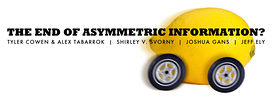Lead Essay
Tyler Cowen and Alex Tabarrok argue that the age of asymmetric information is coming to an end. In the traditional account, asymmetric information has some unfortunate effects: when the seller has much information and the buyer has little, only goods of poor quality generally appear on the market; they tend to be few in number, and they are bought mostly by rubes. Cowen and Tabarrok argue that this state of affairs, which may once have characterized the market for used cars, no longer obtains there – or in very many other places at all. Replacing it is a world of ubiquitous information, in which many regulations are no longer needed, but in which privacy concerns loom large.
Response Essays
Technology may or may not be eliminating asymmetric information. But either way, says Joshua Gans, regulation is here to stay. Whether it operates as a first line of resort or a last one, we ought not to do away with it entirely. From this perspective, technology should not so much abolish regulation as push it into the background and make less often invoked. Gans goes on to complicate the picture of technology delivering better information in the used car market: As cars become more reliable, they last longer, and they are more likely to go through multiple owners. The expansion of this market may have prompted technological developments in car-related information, rather than vice versa. Gans then turns to police body cameras, noting grimly that they only work when police themselves turn them on. He recommends pervasive citizen monitoring of authorities as the appropriate way to end this information asymmetry.
Shirley Svorny looks at the ways that patients, doctors, and hospitals are using information in new ways - and calling old regulations into question. Whereas state medical licensure may have served a valuable purpose in the past, it is much less clear that it maintains the same importance today. Better information technology as well as changes to liability, certification, and malpractice underwriting have combined to offer much better information to all parties in medical care. Innovations such as retail clinics, telemedicine, and increased roles for non-physician clinicians all stand to improve the quality of medical care while also reducing costs. But a big obstacle commonly remains: the state licensing laws themselves.
Jeff Ely takes a skeptical and Hayekian look at the idea that the age of asymmetric information is ending. He notes that improvements in information about health outcomes will not help solve the fundamental problems of risk sharing that the insurance market addresses. In Hayek’s way of thinking, markets exist above all because information is asymmetrical; if all players had all relevant information, market prices would be wholly unnecessary, and allocations would happen both voluntarily and without prices. That world is so utterly different from our own that it’s hard even to think about it for very long. It also shows no signs of materializing anytime soon.
The Conversation
Coming Up
Discussion through the end of the month.

